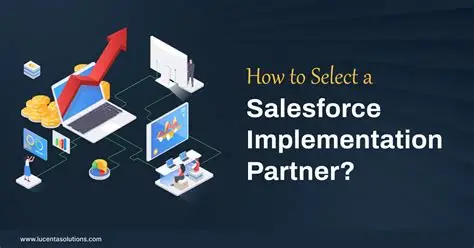When you think about transforming the way your business manages customers, sales, and operations, Salesforce often comes to mind. But here’s the real secret few talk about—your success with Salesforce doesn’t just depend on the software. It depends on choosing the right Salesforce Implementation Partner in Denver. It’s a bit like buying a high-performance car. Even the best engine won’t perform well if the mechanic installing it doesn’t know what they’re doing.
So, how do you make that choice confidently? What should you look for? And why does the partner matter so much? That’s exactly what we’ll unpack together—clearly, simply, and in a way that helps you make a smart, informed decision.
Understanding the Role of a Salesforce Implementation Partner
A Salesforce Implementation Partner is more than a vendor—they are the team that helps configure, deploy, customize, and optimize your CRM. They translate business needs into Salesforce workflows, automations, dashboards, and integrations. Without the right partner, companies often end up with a system that looks powerful but feels unusable.
Why Denver Businesses Need Specialized CRM Support
Denver’s business landscape is unique—fast-growing startups, tech-driven enterprises, and service-based industries all thrive here. A Salesforce Implementation Partner in Denver understands local market pressures, customer expectations, and regional compliance requirements. That insight makes implementation smoother and more aligned with how Denver companies actually operate.
Signs Your Business Needs a Salesforce Partner
Bold key indicators include:
-
Your team still uses spreadsheets
-
Customer data is scattered across tools
-
Sales reporting takes too long
-
You aren’t using even half of Salesforce features
-
Adoption feels low or frustrating
If even one of those rings true, you’re not alone—and you’ll benefit from expert support.
Key Qualities to Look for in a Partner
A strong partner should have:
-
Proven success stories
-
Industry familiarity
-
Transparent project timelines
-
A structured implementation methodology
-
User-training resources
Choosing without evaluating these qualities is like hiring based on a handshake—not a résumé.
Experience and Certifications that Matter
You don’t need a partner with every badge under the sun—but some certifications reveal genuine expertise, such as:
-
Sales Cloud Consultant
-
Service Cloud Consultant
-
Salesforce Administrator
-
Platform App Builder
The more tailored the certification to your business needs, the better.
Local Expertise vs. Remote Teams
A Denver-based partner offers:
✅ On-site workshops
✅ Time-zone alignment
✅ Familiarity with local industries
Remote teams may work too—but when communication matters, proximity helps.
Customized Solutions vs. One-Size-Fits-All
Some partners install cookie-cutter setups and walk away. The right one will:
-
Map workflows to your business
-
Understand how your teams operate
-
Build automation that feels natural
-
Avoid unnecessary complexity
Think of Salesforce like a suit—tailored fits better than off-the-rack.
The Importance of Communication and Collaboration
Great Salesforce partners:
-
Listen before building
-
Share progress openly
-
Offer training, not just tools
-
Provide honest recommendations
Bad communication leads to bad adoption—simple as that.
Common Mistakes Businesses Make When Choosing a Partner
Some pitfalls include:
❌ Choosing solely based on price
❌ Not checking client references
❌ Ignoring post-launch support
❌ Assuming all partners work the same
Avoiding these mistakes alone can save months of frustration.
How the Right Partner Accelerates ROI
The right partner delivers:
-
Faster deployment
-
Higher user adoption
-
Better customer data visibility
-
More accurate forecasting
-
Increased productivity
In other words—Salesforce starts paying for itself sooner.
Real-World Benefits for Denver Companies
Local businesses report:
⭐ Streamlined customer onboarding
⭐ Stronger sales pipelines
⭐ Automated service ticket routing
⭐ Integrated marketing and sales data
These improvements turn CRM from a tool into a growth engine.
Questions to Ask Before Hiring a Partner
Ask things like:
-
How do you gather business requirements?
-
What industries do you specialize in?
-
Do you offer ongoing support?
-
How do you measure success?
The answers reveal more than a proposal ever will.
Cost Considerations and Budgeting Smartly
A good partner helps you:
-
Avoid unnecessary add-ons
-
Phase work to match budget
-
Prioritize high-value features
-
Understand licensing options
Affordable doesn’t mean cheap—smart spending is strategic.
Ensuring Long-Term Support and Scalability
Your business will evolve—so should Salesforce. A strong partner offers:
✅ Admin support
✅ Training refreshers
✅ Optimization reviews
✅ Road-mapping
CRM success isn’t a launch event—it’s an ongoing journey.
Final Thoughts – Making the Choice with Confidence
Choosing the right Salesforce Implementation Partner in Denver can truly make or break CRM success. With the right expertise, communication, customization, and ongoing support, Salesforce becomes a powerful driver of growth instead of a complicated system collecting digital dust.
Frequently Asked Questions
1. Why is choosing a Salesforce Implementation Partner in Denver important?
Because local partners understand regional business needs, market challenges, and operational expectations better than generic providers.
2. How long does a Salesforce implementation typically take?
Depending on complexity, anywhere from a few weeks to several months—custom requirements influence timelines.
3. What questions should I ask a Salesforce partner before hiring them?
Ask about experience, certifications, methodology, support, pricing transparency, and industry familiarity.
4. Can small businesses benefit from a Salesforce partner?
Absolutely—partners can streamline setup, reduce mistakes, improve adoption, and prevent wasted spend.
5. What happens after Salesforce is implemented?
A good partner provides training, optimization, troubleshooting, enhancements, and long-term.
